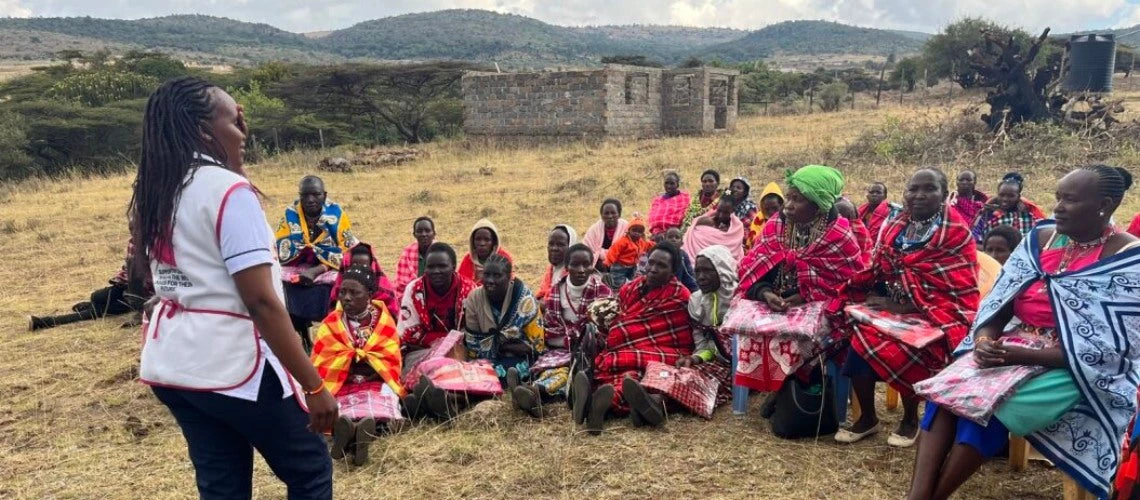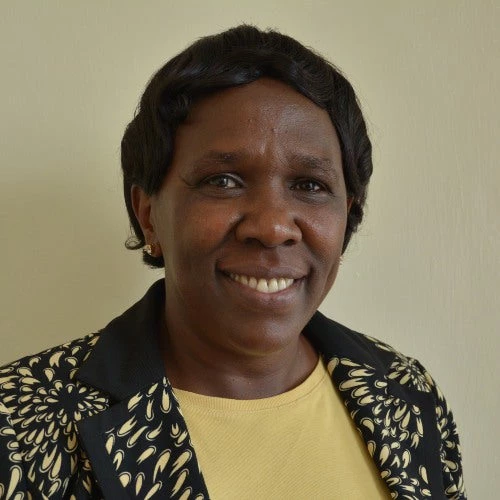 Reginah, a nurse trained under Kenya’s program, discusses health practices with women and adolescents in her community. Copyright: Nansia Constantinou/Global Financing Facility
Reginah, a nurse trained under Kenya’s program, discusses health practices with women and adolescents in her community. Copyright: Nansia Constantinou/Global Financing Facility
Health workers are the backbone of health systems that meet the needs of their communities. In remote settings, the role of midwives and nurses is even more critical to deliver lifesaving health services such as pregnancy care, safe deliveries, and nutrition counselling.
In Kenya, over a third of the population (19 million) live in arid and semi-arid areas, which are particularly vulnerable to climate, economic and health shocks, and crises. Ongoing efforts have been focused on strengthening the health workforce to reach these areas.
With support from the World Bank and the Global Financing Facility, under the Kenya Health Sector Support project and the Transforming Health Systems for Universal Care project, the government of Kenya initiated a program to make training accessible to nurses from some of Kenya’s most vulnerable communities where access to quality health care is limited. This is lifting entire communities.
Improving community health with Kenya’s nurse training program
Put simply: there is no greater opportunity for supporting communities than boosting the health workforce. Through the program, over the last seven years, we were able to provide scholarships for 1,200 nursing students that were selected from communities with the lowest maternal and child health indicators. Many of these students came from minority populations that have sometimes felt training was out of reach to them because of lack of resources.
This program is a win-win. We are helping to empower members of the community by providing this education and at the same time are improving community health. By training nurses from these communities, the program ensures services are adapted and delivered in a way that serves the specific needs of women and children. Nurses can speak the local language and understand the customs of their communities which is key to building trust and improving uptake of health services.
Right now, close to 600 nurses are employed by the government and are deployed in health facilities that often have very few skilled professionals. Another group is providing services in local private health facilities. The nurses also supervise local community health workers to improve services. This has helped mothers and children access quality and dignified care.
The impact on Kenya’s communities
The program has placed a lot of emphasis on midwifery and special training for emergency maternal and neonatal care. For example, the nurses are equipped to treat women who would previously have been transferred to a hospital 15-20 kilometers away by motorbike if they experienced difficulties in labor. Now, more women can access pregnancy care and deliver their babies safely. Focusing on these harder to reach communities is a critical part of the country's broader efforts to strengthen the health system and improve outcomes. In fact, most recent data shows that under-five mortality in Kenya has been more than halved and there has been an increase in mothers attending skilled antenatal care over the past two decades. There has also been an increase in child vaccinations.
Second, there is greater trust in the communities, and this allows more health information to be shared and heard. Nurses are having open discussions about the value of family planning and immunization and debunk myths that may be circulating on pregnancies and female genital mutilation. This is making a significant difference to the health of the community.
Third, the nurses are becoming role models in communities. They are showing what is possible when they go back to school and earn income to provide a better life for them and their families. They are giving the rest of their community hope through improved health and showing that other paths are possible. This is transformational.
Looking forward
Kenya is committed to building stronger health systems and this program has been at the front and center of these efforts – at the forefront of advancing equity and universal health coverage and building health systems resilience.
I am immensely proud of what we have done so far; but I am also cognizant of how far we must go. Of course, I want the program to grow: bring in more partners, train more nurses, expand into more communities. We still need more investments in infrastructure, medical equipment, and commodities. We need to continue creating the right enabling environment and provide the right incentives. If we can do that, we can make sure that nobody is left behind and the hardest to reach communities across Kenya can receive the care they deserve.
To receive weekly articles, sign-up here


Join the Conversation